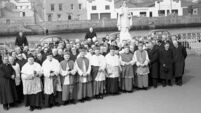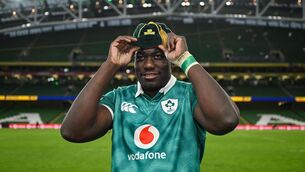Much to do in the race for the Presidency

Maria Steen is pictured with her husband Neil outside Dáil Éireann last Wednesday after she failed to get the required number of votes to meet the quota to run as a candidate for the President of Ireland. Picture: Sam Boal/Collins Photos
The presidential election is leisurely stumbling toward a conclusion as, to use a biblical reference, ‘the sheep’ (those deemed entitled to compete in the upcoming election) are being separated from ‘the goats’ (those deemed unworthy of competing for the highest office in the land).
In the first category are the candidates of the established political parties – Heather Humphreys of Fine Gael (Fine), Jim Gavin of Fianna Fáil (Fianna Fáil) and an Independent, Catherine Connolly.
In the second are the might-have-beens who have struggled to qualify for the opportunity of getting on the ballot. This is despite the clichéd subtext of the office being open theoretically to everyone while the two main parties – Fianna Fáil and Fine Gael specifically – have exercised an effective veto by directing their members not to facilitate other candidates.
Thus anyone attempting to break the stranglehold politicians of the main parties exert on the office are almost casually being dismissed as part of that grand community of eccentrics whose ambition is markedly out of sync with their talents.
That’s not to say that a number of chancers for purely personal reasons did not attempt to subvert the process. Indeed it compelled a quirky letter from a reader of announcing tongue in cheek that in case people were wondering if he was thinking of ‘throwing his hat in the ring’ that he was informing the nation that he had decided not to do so this time!
The illusory conviction of individual merit in a series of wannabe presidents is underlined by, in comparison, the resounding triumph of the present incumbent of the office, Michael D. Higgins. Though Michael D. lost some brownie points in reneging on his promise not to seek a second term and could come across occasionally as a bit preachy in his ‘discourses to the nation’, most people agree his presidency of 14 years was a stunning success. He grew on us and eventually, I would suggest, he stood head and shoulders (not literally speaking, of course) over his predecessors as the most loved Irish President in living memory.
But it is well to remind ourselves that, although as this campaign has demonstrated, the presidency is regarded as the preserve of established political parties, some of its more effective holders of the office – Mary Robinson, Mary McAleese and, going back a few years, Douglas Hyde – were political ‘outsiders’.
The reality is that, with the spoils of this election dispersed exclusively between the main political parties, it is obvious that there is a marked democratic deficit in the narrow choice of candidate. Maria Steen, a conservative candidate and a member of the Iona Institute, almost made it on the ballot. A barrister and one of a small cadre of influencers mainly responsible for the defeat of the recent referendums on ‘family’ and ‘care’ – the effort to change the constitution regarding the family and the role of women – Steen was a worthy candidate for president and her absence has not just effectively disenfranchised a significant category of voters but has emphasised the predicable party political dynamic that excludes a real contest.
I say that not because I would have voted for her (I wouldn’t) but because the democratic imperative, now under such pressure in our world, needs to be respected, enhanced and cherished at every opportunity. A presidential election where the spoils are being divided between the established parties to the exclusion of the wider electorate sends all the wrong signals.
Sinn Féin too has to bear some of the responsibility for this. Following a mysterious process of selection and with teasing announcements beforehand that their decision would be ‘a game-changer’, they ultimately opted to support Catherine Connolly. It was not like Sinn Féin to carry out such a long and prolonged consultation – to go through the pretence (if they will pardon the expression) of ‘keeping their powder dry’ – as their decision-making tradition has been mainly confined to just miming whatever tune emanates from a smaller more focussed group in head-office.
What ultimately became clear from Sinn Féin’s play-acting was that their interest in the presidency was confined to building an alliance of the Left in preparation for the next general election. No doubt too some reservations were around the wisdom of spending their savings on what, despite their official protestations about the significance of the celebrated ‘first office of the state’, is politically of less importance than winning the next general election.
Sinn Féin, with apparently millions available to them in the funds at their disposal – much of it harvested in North America from the armchair patriots of the diaspora – seem to be opting to spend the lolly more wisely in four years’ time when (once more with feeling) they will attempt to achieve the double of electoral dominance in Ireland, both North and South. I fear Catherine Connolly’s presidential campaign will benefit significantly less from Sinn Féin’s financial contribution than from their opportunity to get a steal on Fianna Fáil and Fine Gael. This is not what should characterise an election for the presidency of Ireland.
Nor indeed is the minimalist listing of Gavin, Humpheys and Connolly – the smallest field of candidates in 35 years. Gavin has made a steady but not spectacular start, displaying a strange nervousness for a man so highly skilled and so lavishly gifted, betraying too a certain unease with the determinedly political dimension of the enterprise.
Humphreys has her own problems, not least dealing with the absurd notion that as a practising Protestant she may be at a disadvantage in the hustings – surely, if anything, the opposite is the case. With Connolly’s interview with the BBC, the wheels came off spectacularly when she argued that Hamas, a designated terrorist organisation, should have a role in the eventual governance of Gaza, something 99% of Irish voters would reject as extraordinarily naïve.
Not a lot done, as we say, but much to do.




